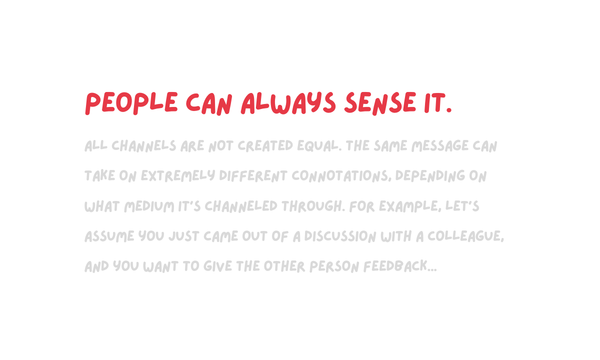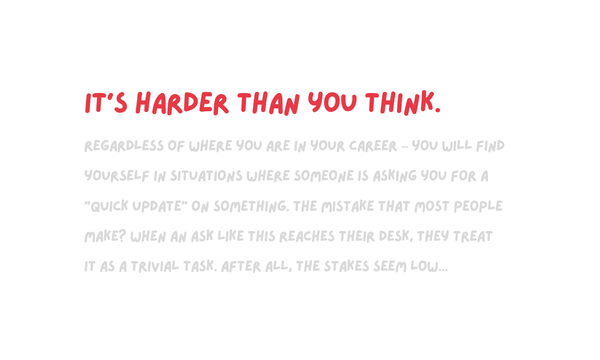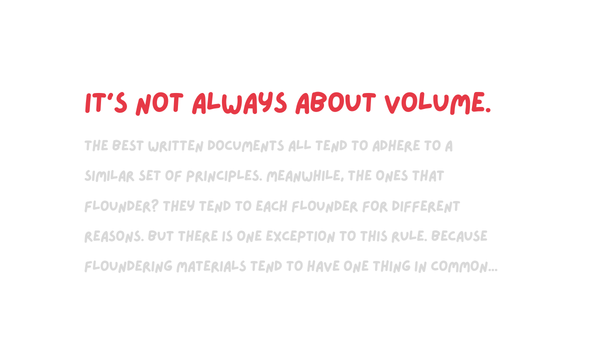When someone said I was good, but not "great"
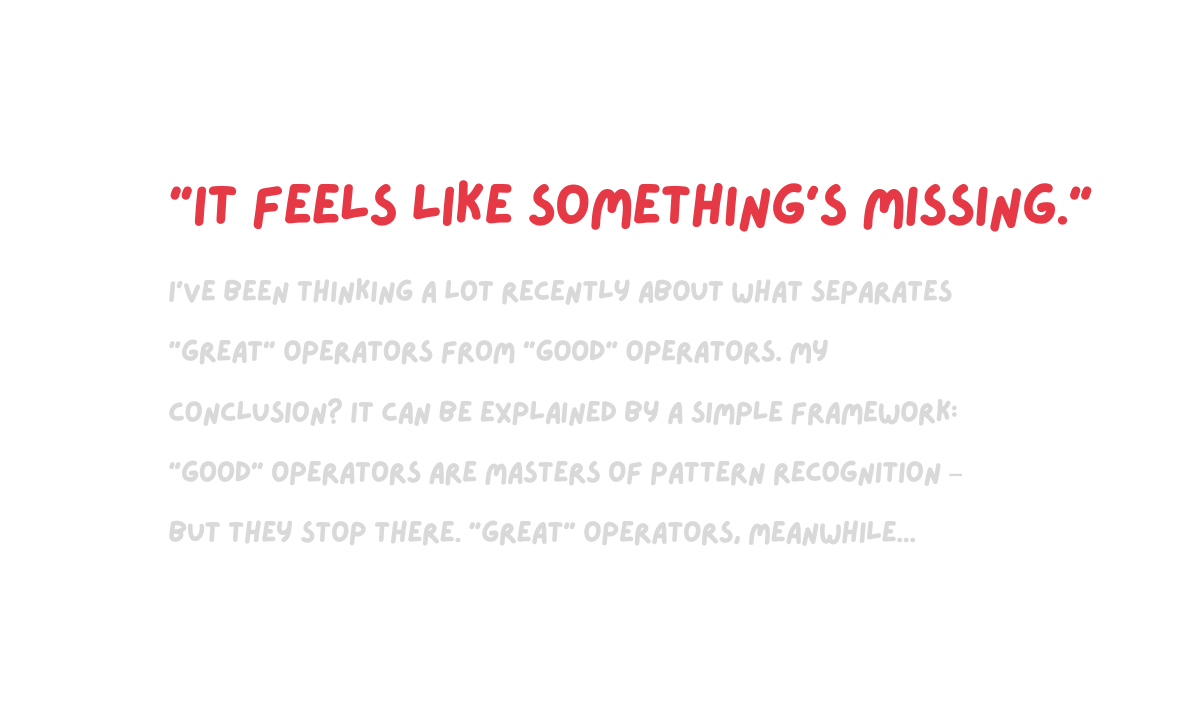
I recently remembered a conversation I had at work – even though it happened more than 10 years ago.
At the time, I was a couple years into a new role. As performance review season was approaching, I sat down with a more senior teammate to gather some feedback.
I've forgotten most of the details (obviously), but one thing he said stuck with me:
"You're doing well – but it feels like there's just something missing."
This wasn't communicated with malice or condescension, of course. But it was certainly ambiguous – and I didn't know what to say.
So, in order to act like I knew what I was doing – I simply smiled and nodded along. I never clarified what he meant.
But now, more than a decade later? I think I have the answer.
👋 Join 4900+ readers and subscribe to Herng's Newsletter for free:
The difference between "good" and "great"
I've been thinking a lot recently about what separates "great" operators from "good" operators.
My conclusion? It can be explained by a simple framework:
- "Good" operators are masters of pattern recognition – but they stop there.
- "Great" operators are also masters of pattern recognition – but they also challenge assumptions.
If you think about it in the form of a 2x2 matrix (because why wouldn't you) – it boils down to the following framework:
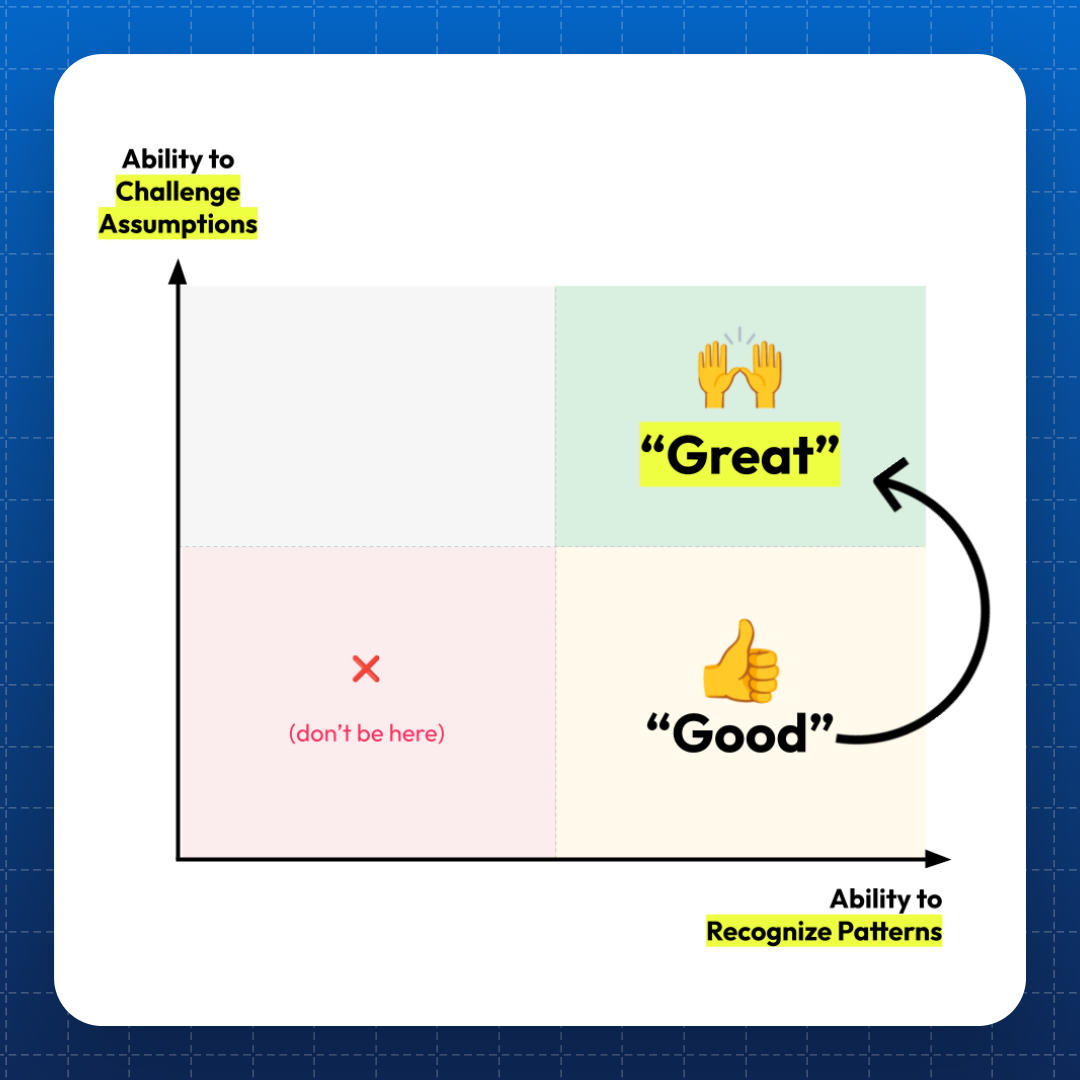
What is this saying, exactly? Well, a few things:
- Pattern recognition is critical. When people say "building up experience?" This is it. It's the process of accumulating datapoints, sharpening your intuition, and making better decisions as a result.
- ...But pattern recognition alone isn't good enough. Sure, it's a non-trivial skill and you can't take it for granted. But it only gets you so far.
- "Great" operators are able to flex another muscle. They recognize patterns as well as anybody else – but it doesn't become an excuse for lazy thinking. They're constantly challenging their own assumptions.
This delta between "good" and "great?" I believe that's the "something missing" my former colleague was talking about.
And in today's newsletter – we'll explain what exactly that delta is.
But first: what is "pattern recognition?"
Let's break this down. Pattern recognition requires two things:
- You do (or see) enough "stuff"...
- ...and you learn to extrapolate.
At the start of your career, this will mainly apply to tactics or processes. For example, you might find yourself doing the following tasks:
- Running a business review with Client X
- Crafting an email to explain a new process
- Writing a business proposal to ask for funding
But once you've done these things once or twice? You'll have figured out how these things generally "work." You're able to go from "tasks" to "patterns."
Specifically, mastering these tasks means that you've likely also developed these respective "skills:"
- Managing client needs and implementing governance
- Communicating and driving change management
- Influencing in a data-driven and compelling way
The industry, product, stakeholders, or funding size may all change in the future – but none of it matters. They're all part of the same "pattern."
Pattern recognition isn't just about tactics. As you progress in your careers, it extends to problem-solving as well.
For example, consider the following:
- You're asked to estimate the potential upside from building a new product feature.
- You have limited experience in this field – but it doesn't stop you. You've done enough market-sizing exercises in the past to know the "pattern."
- You haven't collected data or built your model yet. But in your head, you've already cracked it. Pattern recognition means that the rest is simply execution.
Or consider this example:
- You're analyzing the economics of a partnership proposal that has been brought to you.
- Even though you haven't been involved in this particular deal so far, you've done enough deals in the past to know what hidden risks to look out for.
- This allows you to take a "shortcut" and focus on examining what truly matters. You're able to add value quickly as a result.
In all these situations, pattern recognition allows us to take on "new" challenges by reasoning our way through it – and often efficiently – thereby extending our impact.
Okay, so why isn't this good enough?
👋 Join 4900+ readers and subscribe to Herng's Newsletter for free:
What "great" operators do
Pattern recognition is important – but it's a double-edged sword.
Because once you've developed the ability to "speed-run" through things thanks to pattern recognition?
You also run the risk of forgetting to think in first principles, and jumping directly to conclusions.
And that is why pattern recognition alone isn't good enough.
To be a "great" operator, you need to remember to challenge underlying assumptions – even when it doesn't seem like you have to.
Even when you feel like you've "been there, done that" already.
For example, consider the following situation:
For a "good" operator, this goes through their minds:
- "OK, I've seen this pattern before. I'll chase again, and escalate through a series of soft nudges (direct pings or emails) and hard reminders (copying their manager)."
- "I will also make clear that in the absence of meaningful feedback, I will make an executive decision on the targets. This will instill urgency, and allow me to move forward without bottlenecks."
This is not necessarily wrong. It's sharp and effective, in fact. It's clear that this person has dealt with these types of situations before, and has a protocol to rely on.
But consider what goes through the mind of a "great" operator, who is not afraid to challenge their own assumptions:
- "My plan assumes that people have the feedback I need, and that they just haven't prioritized responding to me. What if this assumption is wrong?"
- "I'm also assuming that playing the manager card will get people to care. What if this isn't true for everyone?"
- "My plan also assumes that having a forced target before the deadline is better than having no target at all. What if this isn't true? What if this doesn't actually help with business rigour?"
Here's the thing: pattern recognition is extremely valuable, but it tends to only work well under similar sets of assumptions.
And if those assumptions no longer hold?
Then you get to see who is actually thinking deeply – and who is just blindly going through the motions.
For instance, in this case: let's assume that one particular teammate has failed to give feedback on time, because he wants more time to flesh out his strategy.
This means that we could consider doing any one of the following things:
- Stick to our plan and demand a target before the deadline (implied principle: achieving fairness and not setting a bad precedent is the most important thing)
- Ask for targets still, but allow for it to be revised in a month (implied principle: it's ok not to have perfect rigour; practicality is important as well)
- Offer to accept a qualitative goalpost instead (implied principle: some directional goalpost is better than having none at all)
Which is the right option? Hard to say. It depends on our guiding principles, what we're optimizing for, and our read of the situation.
But what is clear is this: if we didn't "push" ourselves to challenge our assumptions ("As long as I escalate, people will eventually give me what I want")?
We would never have pursued this line of thinking, and never even gotten close to coming up with alternative solutions.
👋 Subscribe for free to get Herng's newsletter directly in your inbox.
Another example of what "great" operators do
It's not just people and processes. Challenging assumptions is also critical when it comes to problem-solving.
For example, consider the following hypothetical scenario:
- You work for a company that sells digital courses online. Your company's newest product ("Kids Who Can't Read Good But Still Want to AI") has just launched, and is seeing strong initial demand.
- As such, you've been asked to explore whether we should increase the selling price for this course – and if so, how much.
If you're a really good operator? Your strong pattern recognition skills will come into play here.
In order to maximize sales and profits, you'll probably draw on your past experience and start examining things like:
- Competitive benchmarks
- Marketing positioning
- Distribution channels
- Elasticity of demand
- Buyer profiles
Eventually, all these things will converge and help you develop a robust model and a solid pricing recommendation.
But while this is highly commendable already? Something's missing.
Because who said the goal has to be to maximize sales or profits? Who told us that we have to dial the price up just because demand is good?
Who told us to make these assumptions?
Indeed, this is what differentiates "great" operators from the rest. Because instead of simply taking a prescriptive brief and jumping directly into problem-solving, they take time to challenge assumptions.
They think about things like:
- "Is the goal really to maximize profits with this course? What if that's not the right assumption?"
- "What if this course should be positioned as a way for us to drive user acquisition at scale? What if we intentionally leave money on the table as a way to build up our audience base at this stage?"
- "What if this course is our way of establishing credibility in a new domain? How would that change the metrics we're optimizing for?'
All of a sudden, things that appear to be obvious no longer seem that obvious anymore. We've gone from simply thinking about price tags, to examining the company's user acquisition and product portfolio strategy.
We're on a whole different level altogether.
And that is how "great" operators bring value to the table.
Parting thoughts
Look, when my former colleague told me that there was "something missing" in my performance – I don't know if this is exactly what he had in mind.
But now, a decade plus later, what is clear to me is this:
- Back then, I was extremely good at pattern recognition and solving similar types of problems. That's why I was "good."
- But when it came to problems I hadn't quite seen before? Or problems that didn't quite fit the mold? I struggled.
- The reason was simple: I simply hadn't quite learned how to challenge assumptions. I hadn't learn how to think deeply and reason my way through new types of problems.
The path from good to great isn't easy – but it starts with challenging assumptions.
